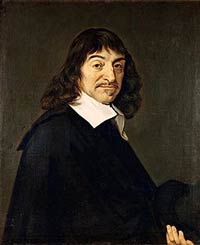
| Born: Mar 31, 1596 in La Haye en Touraine, Kingdom of France |
| Died: Feb 11, 1650 (at age 53) in Stockholm, Swedish Empire |
| Nationality: French |
| Fields: Metaphysics, Epistemology, Mathetics |
| Famous For: contributed to the Scientific Revolution |
René Descartes (1596-1650) was a French polymath who is particularly known for his work on mathematics and philosophy. He invented the Cartesian system of co-ordinates, which is named in his honor. Although French, he lived much of his life in the Netherlands. His work remains extremely influential to this day, with Meditations of First Philosophy still considered a standard work for university undergraduates studying philosophy.
Descartes’ Personal Life
Descartes was born in Indre-et-Loire, in the small town of La Haye en Touraine, which is now known as the town of Descartes. His mother died when he was still an infant and his father was a member of the Breton Parliament. When he was about ten years old, the young René was sent to a Jesuit college in La Flèche, and here he began to learn about physics and mathematics.
He was particularly interested in the pioneering studies of his near-contemporary, Galileo. Descartes graduated in 1616 and went to university in Poitiers, studying law because that was what his father wanted him to do.
Work in Mathematics
Descartes was briefly in the Dutch army led by Maurice of Nassau in 1618, but the calling of a truce between Spain and the Dutch allowed him the free time in which to develop his study of mathematics. At this time, he met Isaac Beekman, who had been struggling with a complex problem. The young Descartes solved it, much to the older man’s amazement.
Later, Descartes again served as a soldier, this time under the Bavarian Duke Maximilian. In 1620, while serving in this capacity, he took part in the Battle of the White Mountain.
Philosophical Development
Descartes drew a deliberate distinction between his own thoughts and the views of the men who had gone before him, such as Aristotle and Augustine. He wrote a treatise about emotions titled Passions of the Soul, and in this he stated boldly his intention to write as though he were the first man to have written on the subject.
He rejected the idea that bodily substance should be divided into form and matter, and he objected to the idea that there was any purpose, divine or otherwise, behind the phenomena of the natural world. Instead, Descartes’ theology was clear that in creating the world, God acted with complete freedom.
Descartes and Rationalism
Descartes was also an important figure in the rationalism of the 17th century. In this, he could be seen as the forerunner of men like Gottfried Leibniz and Baruch Spinoza. This brought him into conflict with empiricists such as Jean-Jacques Rousseau, Thomas Hobbes, and John Locke.
Many of the continental rationalists, including both Spinoza and Leibniz as well as Descartes himself, had extensive mathematical knowledge, allowing them to make great contributions to the advancement of science. Descartes also coined the philosophical phrase, “I think, therefore I am” – in Latin, “Cogito ergo sum” – which he included in his Discourse on the Method of 1637.
Death
Descartes died in the Swedish city of Stockholm on February 11, 1650. He had been invited to the country because Queen Christina wished to learn from him, but he contracted what proved to be a fatal bout of pneumonia during his visit.